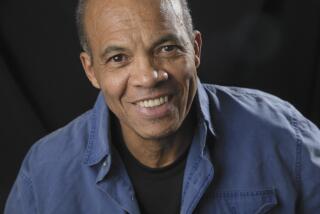Whites Whom Only Blacks Can Save : THE MIND OF SOUTH AFRICA <i> by Allister Sparks (Alfred A. Knopf: $24.95; 424 pp.) </i>
Fashionable though it is these days to make presumptuous claims about the end of history, South Africa clearly testifies to the stubborn persistence of history--to what the French philosopher Jean-Paul Sartre once described as “the past that weighs like a nightmare on the brain of the living.” It is the “deadly weight” of history, “the terrible tradition of a dialogue between master and servant,” that Nelson Mandela, leader of the African National Congress, invoked on the occasion of the ANC’s first meeting ever with the South African government last week. It is this same burden of history that is the subject of Allister Sparks’ extraordinary book, “The Mind of South Africa.”
With eloquence and scholarly precision, Sparks, one of South Africa’s foremost journalists, explores the “forces of history, culture, and circumstance” that have influenced the attitudes and interactions of his country’s inhabitants--from the Dutch Calvinists who came to the continent imbued with a sense of divine mission, to the British imperialists who exploited the country’s vast economic potential, to the Africans, Indians and “Coloureds” who have always lived, in one fashion or another, beyond the pale.
Sparks’ account is highly selective. One learns little, for instance, about how the British came to acquire the Cape colony in 1795 and few details about the great Boer War they fought against the Dutch descendants, the Afrikaners, and how the British victory in that war led, perversely, to South African independence. Sparks leaves that task to others, instead concentrating on those aspects of events that might impart to readers familiar with South Africa’s racism an understanding of how it came about and the difficulties that its legacy poses for the country.
The Afrikaners are central to Sparks’ story, as well they should be, bearing primary responsibility not for South Africa’s racism--that they share with the British--but for the harshness of that racism. Their forebears, though largely social and economic washouts in 17th-Century Holland, saw themselves nonetheless as God’s elect--particularly in relation to the seemingly primitive heathen they encountered on the Cape. Over the course of the next three centuries, this self-image as God’s chosen would harden into the fiercely chauvinist nationalism that is the underpinning of today’s apartheid state.
Critical to the development of that nationalism was the deep sense of grievance that the Afrikaners bore the British. Embittered by their loss of autonomy and, more important, by Britain’s piecemeal granting of rights to people of color (blacks even enjoyed a limited franchise), the Afrikaners made their Great Trek to the “Deep North.” But they could never migrate quite far enough; the discovery first of diamonds and then of gold brought them into renewed conflict with the expansionistic British, culminating in the Afrikaners’ defeat in the Boer War. Even more searing than defeat, however, was the economic ruin that the Afrikaners faced in its wake, leading them to take the first steps toward institutionalizing segregation against blacks, their economic competitors--a process that would intensify after World War II with the ascension to power of the ruling Afrikaner Nationalist Party.
One cannot begin to understand the seeming intractability of South Africa’s race problem today without an appreciation of the Afrikaner sense of grievance and isolation. Sparks goes so far as to confess to “being moved by the authenticity of the Afrikaner dilemma.” He knows that, as an English-speaking South African, he is more or less at home in any part of the English-speaking world. Not so the Afrikaner. “He has the vulnerability of an endangered species. . . . He is portrayed by the world as a racist monster, and much of what the apartheid system does is indeed monstrous,” but, Sparks asks, “would others have behaved very differently in his situation?”
Yet at the same time, Sparks insists, no people has the right to build its nation on the deprivation of another’s rights--to restrict 75% of the country’s population to 13% percent of the land, to enforce this restriction with acts of violent repression, and to cloak this repression in professed concern for the preservation of black racial and cultural identity. Sparks contrasts Afrikaner exclusionist nationalism with the vision of a nonracial society enshrined in the Freedom Charter of the African National Congress and concludes that Afrikaners--now challenged as they have never been before--must finally heed the injunction of history and accept the immutable reality of their multinational state.
As well they have begun to do. And while Sparks’ book was written before the dramatic moves taken by the South African government over the last three months, this in no way diminishes the value of his reflections on his country’s future. His sober assessment of the fundamental issues dividing blacks and whites--over group rights, the economic system, and political participation--and of the serious differences among blacks themselves nonetheless leaves room for a considerable margin of hope. With the passion of a true patriot, Sparks looks forward to the day when his country ceases to be a symbol of racism, and instead of squandering its resources on hateful division is able to tap its potential as an engine of African economic development. It is Sparks’ “dream for the new millennium” but it is a dream many others share as well.
More to Read
Sign up for our Book Club newsletter
Get the latest news, events and more from the Los Angeles Times Book Club, and help us get L.A. reading and talking.
You may occasionally receive promotional content from the Los Angeles Times.






